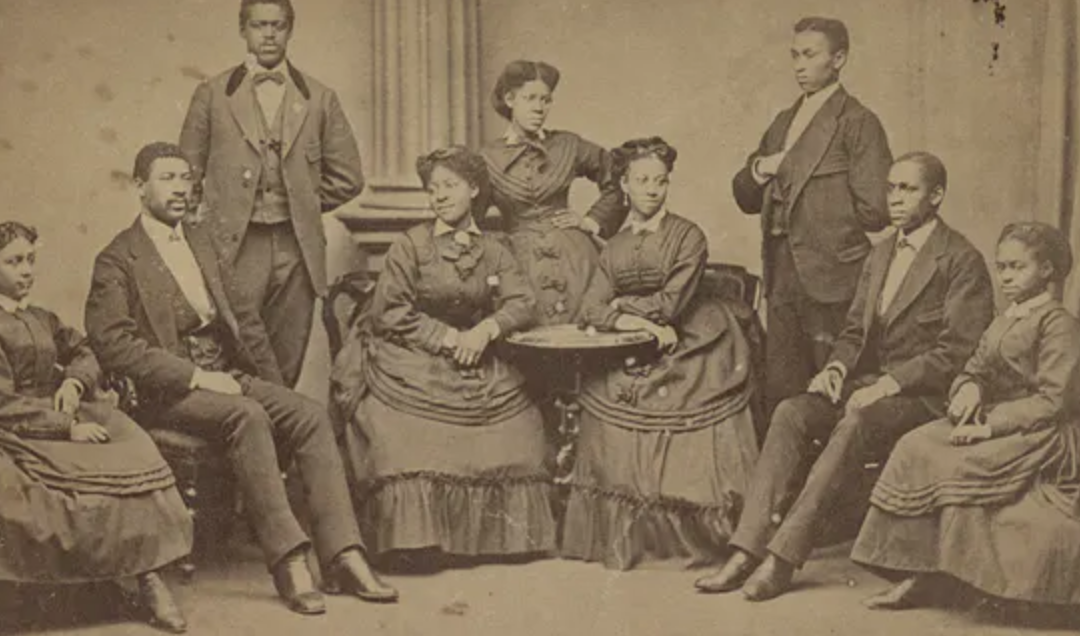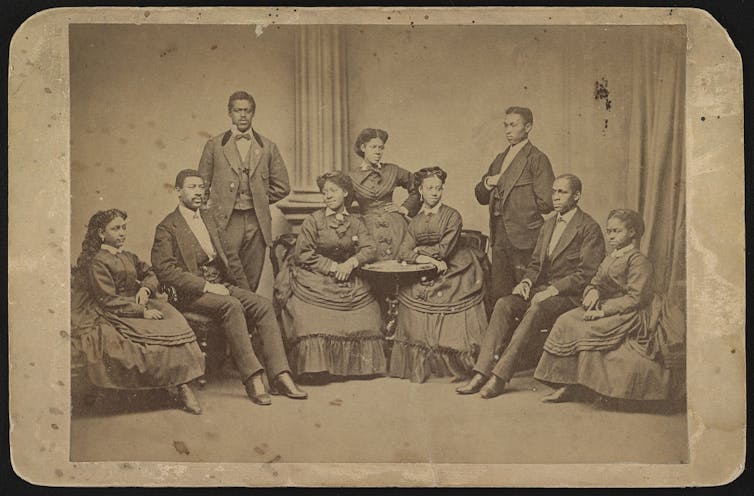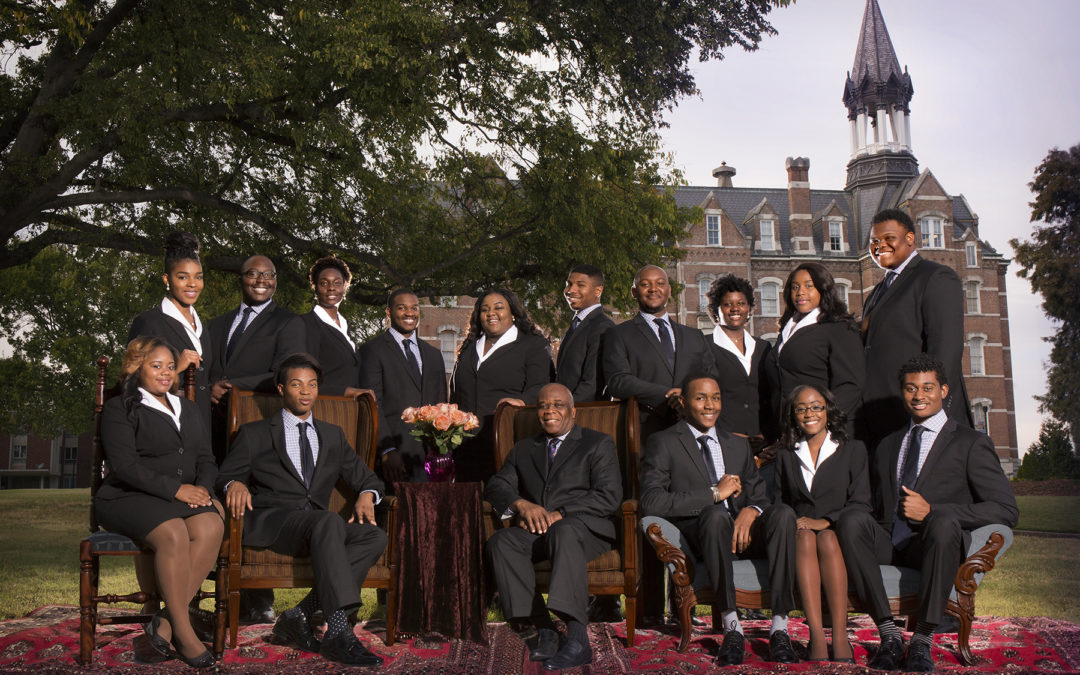
Fisk Jubilee Singers continue to sing spirituals 150 years later
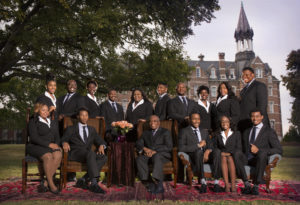
The Fisk Jubilee Singers in 2016. Photo by Bill Steber and Pat Casey Daley
(RNS) — A century and a half ago, nine young men and women embarked on a trip from Fisk University, establishing a tradition of singing spirituals that both funded their Nashville, Tennessee, school and introduced the musical genre to the world.
The Fisk Jubilee Singers, based at the historically Black university founded by the abolitionist American Missionary Association and later tied to the United Church of Christ, started traveling 150 years ago on Oct. 6, 1871. They since have continued to sing so-called slave songs such as “Down by the Riverside” and “There Is a Balm in Gilead” and stood on stages from New York’s Carnegie Hall to Nashville’s Ryman Auditorium.
Musical director Paul Kwami has led the group since 1994 and sang with it when he was a Fisk student in the 1980s. Then and now he views the songs as not only expressions of the religious beliefs of enslaved people, but also of the original singers and the ones who continue to sing today.
“There are songs like ‘Ain’t-a That Good News,’ which is a song that talks about having a crown in heaven, having a robe in heaven,” said Kwami, a member of a nondenominational Full Gospel church in Nashville. “Well, they’ve never been to heaven, but then they’re singing about heaven — that’s an expression of faith.”
Kwami, a native of Ghana, in West Africa, talked with Religion News Service about how the ensemble began, who should sing spirituals and which of the songs are his favorites.
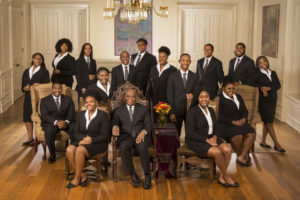
The Fisk Jubilee Singers in Jubilee Hall at Fisk University on Oct. 29, 2020. Photo by Bill Steber and Pat Casey Daley
The interview has been edited for length and clarity.
The Fisk Jubilee Singers won their first Grammy in 2020 for an album that celebrates almost a century and a half of music. What does that say about the endurance of the group and the music that they have sung for so long?
The album was actually produced on the (university’s) 150th anniversary. But then, of course, it is the Fisk Jubilee Singers who won the Grammy, which actually makes me realize that people still recognize who the Fisk Jubilee Singers are. And people still appreciate the music. Additionally, people realize Fisk Jubilee Singers are artists and do not limit themselves to just Negro spirituals. There’s versatility in our choice of music when we have celebrations.
How do you define spirituals, and differentiate them from other forms of African American music sung in Black churches and beyond?
The Negro spirituals are songs that were created by the slaves during their time of slavery. But when we talk about music like jazz or blues or gospel, those genres of music came long after the Negro spirituals were established. And some people even say these other forms of music were birthed out of the Negro spirituals.
When we talk about the Negro spiritual and, say, gospel music, the performance styles are completely different. Gospel music simply deals with church music with a lot of instrumental accompaniment, clapping, a lot of improvisation. But with the Negro spiritual, even though there may be some improvisation, it doesn’t involve a lot of improvisation. Traditionally, Negro spirituals don’t call for instrumental accompaniment.
When the Fisk Jubilee Singers sing, the music is a cappella. The original Fisk Jubilee Singers transformed the Negro spiritual into an art form or concert spiritual. And because of that, clapping, for example, is not recognized as part of a performance of Negro spirituals.
Spirituals are known for their layers of meaning, some of which were hidden to slave masters. Can you give an example of one that is often sung by Fisk Jubilee Singers that reflects that?
One we often sing is “Steal Away to Jesus.” (One) meaning is that we will run away to the North — because we’re stealing away to Jesus — and Jesus was referring to a place of freedom.
When George White, a music professor and Fisk’s treasurer, decided to have singers from the school perform the spirituals for white audiences as fundraisers, was his idea supported by many or was it controversial or both?
To leave Fisk with a group of students to go on a tour, singing to raise money — that was opposed. The administration at Fisk at that time did not believe he would succeed. They thought this was more of an experimental adventure because no one had ever done that. He was not sure of how audiences would receive Black young people singing so he taught them to sing Western (and European) classical music with a hope that would be more attractive to the various audiences. The Fisk Jubilee Singers were also not willing to sing the Negro spirituals because those songs were very sacred to them. But eventually, they started singing the Negro spirituals to the delight of their audiences.
The spirituals were “concertized” for performance for these fundraisers. Do you think anything was lost as the songs moved from the field where slaves had labored to concert halls where people paid to hear them sung?
I don’t think anything was lost. I read a quote by one of the original Fisk Jubilee Singers, and in this book he transcribes some of the songs they sang. I look at the melodies and they’re the same melodies we sing except the arrangements may be different.
How were the singers received at a time when slavery had just ended and African Americans were not welcome in many venues that were segregated?
Originally, they were not well received. There are accounts where people would go into the concerts, listen to the Fisk Jubilee Singers sing and not even give donations. There are accounts of Fisk Jubilee Singers going into hotels and hotel owners, realizing they were Black people, turned them away, wouldn’t give them a place to sleep or food to eat. There was a time when George White was able to purchase first-class coach (train) tickets for them but they were refused admittance into the first-class coaches because of the color of their skin. There is a painting somewhere that someone depicted them looking more like animals on stage singing. So they did go through those types of experiences as they went on their first tour. But I always say the young Fisk students who went out to raise funds for the university kept their focus on their mission and also were able to sing their songs and win the hearts of many people.
There have been debates over whether white people singing spirituals is a form of cultural appropriation. And I wonder where you stand on that issue.
As a musician I don’t agree with that because growing up in Ghana, we were taught songs like the “Hallelujah” chorus from Handel’s “Messiah.” The performance of music, I don’t believe should be limited to one specific culture. Because music, rather, brings people together. I would rather encourage people of every culture to learn music of other cultures.
The Fisk Jubilee Singers sang with The Erwins, a Southern gospel group, in February, including the song ” Watch and See.” How often do the Fisk singers sing music other than spirituals and is that generally well received, or are they criticized for not sticking with the music tradition for which they’re known?
I think one of the reasons we won the Grammy is because we sang with other people and the album consists of a variety of music that actually would not be classified as Negro spirituals. The album consisted of country music. We had some blues. We had gospel. We do want to be remembered as an ensemble that sings Negro spirituals but when there are occasions that call for us to sing other types of music and if it fits into our schedule, we are going to do so.
Do you have a favorite spiritual sung by the Fisk Jubilee Singers and, if so, which one and why?
I have a lot of favorite spirituals. One of them is ” Lord, I’m Out Here on Your Word.” I like that spiritual because it’s a song that helps me to be committed to my work. A line in the song says “If I die on the battlefield, Lord, I’m out here on your Word.” That is telling me that no matter what goes on, I am out to serve God. And I know he is a faithful God. And I have to be faithful to him as well. If I’m serving him, then no matter what’s going on, I trust him to provide whatever I need to succeed in my work.
Another is “He’s Got the Whole World in His Hands.” I love that song, again, because it gives me the idea that God takes care of us.

